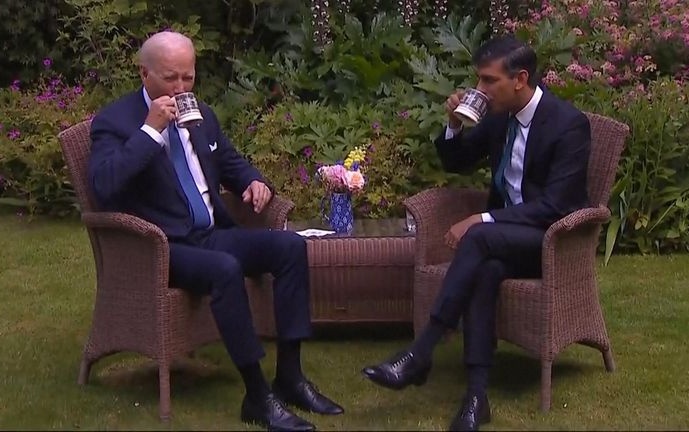Throughout Monday and Tuesday, I spoke with UK and international media about US President Joe Biden’s visit to London, including the issues of Russia’s invasion of Ukraine, the NATO Summit, climate change, and Brexit’s political and economic damage to Britain.
Listen to BBC Radio Wales from 36:31
On Tuesday afternoon with Gareth Lewis, I summarized the first day of the NATO Summit, correcting some misleading headlines to set out the position over Ukraine’s future membership.
I also discuss the effect of the Russian invasion on “world order”:
Vladimir Putin’s gamble has mobilized the world to think about a different multilateral arrangement in which the US is part of an international community to try and ensure security for all.
That has also meant a re-energized European Union, NATO, and Asian countries. We’re on the cusp of an opportunity coming out of a man-made tragedy.
Watch GB News
In an interview on Tuesday morning, I examine the possibilities for Ukraine’s future relationship with NATO, amid the counter-offensive against Russia and this week’s NATO Summit.
'The NATO summit will reach a consensus that NATO can bypass a normal provision – they can bypass paperwork that normally takes several years to complete.'
Professor Scott Lucas discusses Ukraine’s accession to NATO, ahead of the summit in Lithuania. pic.twitter.com/69vMub0HVO
— GB News (@GBNEWS) July 11, 2023
Listen to BBC 5 Live from 1:19.12
Speaking with Nick Bright late Monday, I evaluated the issues covered in the meeting between Biden and UK Prime Minister Rishi Sunak.
I look specifically at support for the Ukrainian counter-offensive and the US supply of cluster munitions to Kyiv and Ukraine’s pledges over their use.
There have been a lot of misleading headlines that there is a real threat to NATO unity. There’s not.
All NATO states and the Secretary General have said that the priority is “You win the war, then we talk about Ukraine’s accession.”
There are differences, but not divisions, over the pace of that accession.
I also knock back disinformation declaring that Biden showed a lack of respect to King Charles III in their meeting at Windsor Palace.
There are certain parts of the British media who were not happy with Biden because the Americans were so firm that the UK Government could not sabotage the Northern Ireland Protocol and expect a trade agrement with Washington.
Supporters of Boris Johnson and hard Brexiteers have been sniping at Biden ever since then.
Watch Discussion with Times Radio
In a morning chat with Stig Abell, I took apart some misleading headlines about a “crisis of unity” in NATO amid Ukraine’s counter-offensive to liberate its territory from Russian occupiers.
How fast do you go with Ukraine’s accession to NATO? I think it will happen but there are differences, not divisions, between allies about the pace.
Listen to Times Radio from 41:21
Earlier on Monday morning, I spoke with Rosie Wright about Kyiv’s relationship with NATO and support for Ukraine’s counter-offensive, including the US decision to supply cluster munitions.
What we should be looking for this week at the NATO Summit is, “What security guarantees are given to Ukraine?”
Listen to BBC Northern Ireland from 47:25
The conversation with Sarah Brett begins with the Biden Administration’s view of UK politics, welcoming Sunak for removing his predecessors’ threat to scrap the Northern Ireland Protocol in the Brexit Agreement.
Joe Biden would not step foot in London until a UK Government dealt with the threat to the Protocol, and that’s what Rishi Sunak did with the Windsor Framework with the European Union earlier this year.
There are still loud voices, especially supporters of Boris Johnson and hard Brexiteers, who are still sniping at the Protocol. So Washington is still watching carefully that the adults are still in the room in the London.
We also discuss whether it’s still fitting to talk of a US-UK “special relationship” — it isn’t — and why cluster munitions are unlikely to cause a rift among allies.


Cluster munitions were not effective in Israel’s war with Hezbollah in 2006. Why does NATO think they will work in this war? And Biden admitted that the US is sending these controversial weapons because it doesn’t have any conventional shells to send to Ukraine. If this is true, how can Ukraine possibly win this war?